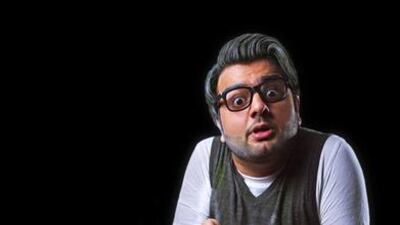After being crowned Best Actor at the Dubai Festival for Youth Theatre last year, Emirati actor Ibrahim Ustadi has his sights set on the prize again with his roles as a megalomaniac and a frayed garment in a laundry in two plays at this year’s edition.
The 27-year-old, who has been wrapping up his day job as a radio presenter in Dubai by 4pm every day to rush to two rehearsals in Sharjah the past few months, is part of the cast of Khaith Wayhik by the Sharjah National Theatre and Boqa'a by the Dibba Theatre, two plays that will be staged during the eighth edition of the Dubai Festival for Youth Theatre (DFYT). The 10-day festival begins today at the Cultural and Scientific Association in Al Mamzar and will showcase five locally produced plays in fusaa (classical) Arabic. The main performances will be simultaneously translated into English.
Ustadi will be joining the cast of Boqa'a on November 13. The play, whose title roughly translates to "spot" in English, is a black comedy where five actors embody forgotten clothes hung in the corner of a laundry for years and plot their escape.
“This character, the one of the oldest garment in the laundry, is my favourite,” says Ustadi. “The five of us play different types of clothing, each with different characteristics. I, being the oldest, am the wise one who maintains the order during heated discussions. So when the clothes talk about ways to escape, I convince them against it.”
He says there is an underlying message for the audience. “More than a message it’s a choice we would like them to think about: you can choose to stay in your comfort zone or challenge yourself, take a risk and see where it gets you.”
After that, the actor will transform into a power-hungry circus crew member in the play Khaith Wayhik that will be staged on November 18. "It is hard to translate Khaith Wayhik into English," says Ustadi. "It's like a metaphor about wearing masks and having multiple personalities."
The story by Mahmoud Abu Abbas is set in a circus, with drama unfolding as tensions emerge between the cast and crew backstage. Ustadi plays a disturbed make-up artist.
“The artist creates the twists in the plot,” Ustadi explains. “My character is a bit complicated because he suffers from psychological issues, but that isn’t evident, at first. The make-up artist tries to control everything in the circus, assuming the role of a manager and manipulating others.” Ustadi says the director Omar Al Mulla had been toying with the concept for the play for a year and teamed up with Abbas to write the script. The four-actor cast began rehearsing in September.
Ustadi began acting in 2005, when he was still in high school, and followed his passion for performing arts during his time as a student at Higher Colleges of Technology, as well. The rigour of a media management and communication masters programme at the Paris-Sorbonne University in Abu Dhabi and commitments of a full-time job haven’t come in the way of his acting career.
He won the promising actor award at the Sharjah Theatre Festival in 2009, bagged the best actor prize at the GCC Youth Theatre Festival in 2010 and won three times at the DFYT in 2008, 2010 and last year.
“And this is all after my parents refused to accept this as a reliable field of work,” says Ustadi, who will be graduating from Paris Sorbonne this month. “They still don’t really approve. But that seems true for most parents who would rather see their children become doctors or engineers, right? The theatre community is a bit isolated from society, in my opinion.
“But I’ve been participating in the festival right from the start and have seen the interest grow each year. It is also a great opportunity to meet actors and directors from across the country and build a stronger Arab theatre community.”
Ustadi says the emphasis on classical Arabic this year poses a challenging setting for young actors, which he welcomes, but would also the like the festival to promote dialect theatre.
“At the end of the day, people connect better when they are presented with work in local dialects,” he says.
“Mandating plays in classical Arabic means we restrict our storytelling capabilities. We have to choose stories that fit the language, and themes such as folklore, which need to be presented in a more colloquial tone, cannot be used.”
aahmed@thenational.ae

